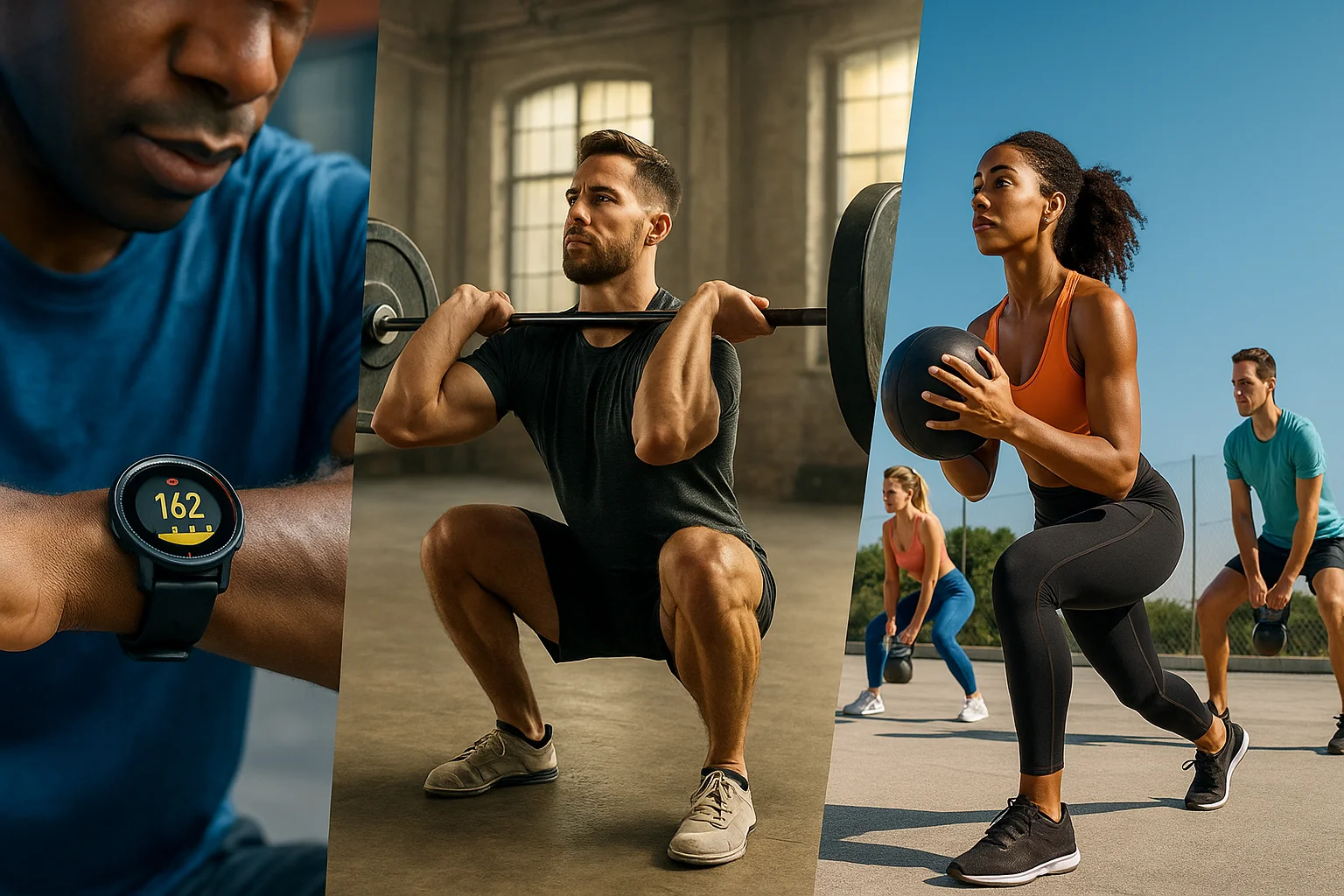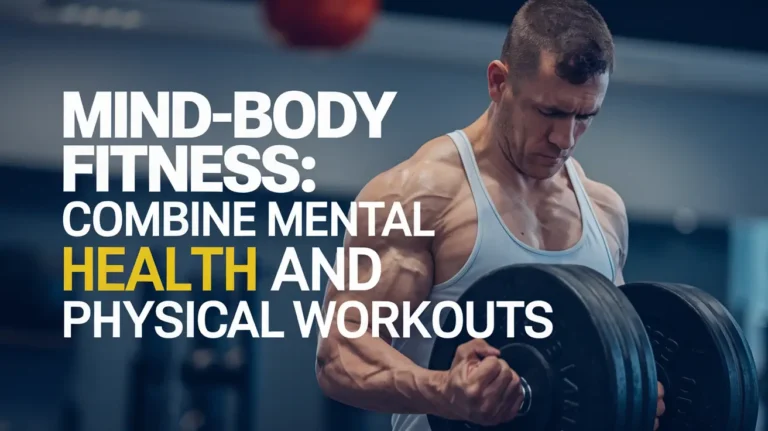Modern life can feel overwhelming and make us feel disconnected from our health. But, research shows that our mind and body are deeply connected. They both play key roles in our health and happiness.
This guide will show you how mental health and physical fitness work together to improve your well-being.
Key Takeaways
- The mind-body connection is scientifically proven, highlighting the effectiveness of exercise in supporting overall wellness.
- Mind-body exercises like yoga, tai chi, and pilates enhance mental clarity, improve balance, reduce stress, and promote mental calmness.
- Engaging in mind-body practices can lead to less stress, better sleep, improved flexibility, and increased muscle strength.
- Combining mindfulness with physical training can amplify workout efficiency, boost endurance, and amplify stress relief.
- Regular movement through exercise can help fend off mental illnesses and support individuals dealing with anxiety and depression.
Understanding the Science Behind Physical and Mental Well-being
Research shows a strong link between exercise and mental health. Physical activity changes our brain in ways that boost our mental and emotional health.
The Role of Neurotransmitters in Exercise
Exercise releases endorphins, which make us feel good and reduce pain. It also boosts serotonin and dopamine, helping with mood and emotional strength.
How Brain Chemistry Changes During Workouts
Exercise calms the body’s stress system, reducing cortisol levels. This helps us handle stress better and feel mentally better.
Physiological Benefits of Regular Activity
Regular exercise makes our brains more flexible, improving learning and memory. It also affects our gut health, which is linked to our mental state.
Wearable tech and digital health tools help us understand the mind-body connection better. They let researchers explore how exercise benefits us.
“Regular physical activity has been shown to reduce symptoms of anxiety and depression according to Better Health Victoria.”
By learning about the science behind physical and mental health, we can use exercise to improve our well-being. This leads to a more balanced and fulfilling life.
The Impact of Exercise on Mental Health Statistics
Many studies show how exercise helps our mental health. A key study in JAMA Psychiatry found that regular exercise lowers the risk of depression by 43%. The American Psychological Association also found that exercise can cut depression symptoms by up to 26%.
Exercise does more than just make us feel better. Aerobic exercises can cut anxiety by 30%, stress by 26%, and depression by 35%. Strength training can reduce anxiety by 20%, stress by 15%, and depression by 25%. Yoga is also very effective, reducing anxiety by 25%, stress by 15%, and depression by 30%.
| Exercise Type | Anxiety Reduction | Stress Reduction | Depression Reduction |
|---|---|---|---|
| Aerobic | 30% | 26% | 35% |
| Strength Training | 20% | 15% | 25% |
| Yoga | 25% | 15% | 30% |
These numbers show how important self-care practices like exercise are for our mental health. Adding regular exercise to our lives can greatly improve our well-being and help us deal with life’s challenges.
“Exercise is not just about aerobic capacity and muscle size. It’s also about mental well-being and intellect.”
Mind-Body Fitness: The Ultimate Integration Guide
Mindfulness and physical training together are a powerful mix. They help us find a new way to get fit that makes us feel good inside and out.
Combining Mindfulness with Physical Training
Mindfulness makes our workouts better. It helps us be more aware of our bodies and think clearer. We can add things like deep breathing and saying thanks to our routines.
Balancing Mental and Physical Exercises
Getting fit means taking care of our minds and bodies. Adding meditation and mental strength to our workouts helps us stay calm and focused. This balance makes us feel whole.
Creating a Holistic Workout Routine
Our goal is a workout that has everything. It should include cardio, strength training, and activities like yoga. This mix makes us strong, both inside and out.
Starting this journey helps us learn and grow. It opens doors to better health and happiness.
The Role of Stress Management in Physical Performance
Stress, whether it’s mental or physical, can greatly affect our athletic performance. Chronic stress raises cortisol levels, a hormone that hinders muscle growth and fat storage. It also hampers recovery. But, by using effective stress management, we can improve our physical and mental health, leading to better performance.
The American Psychological Association says reducing stress boosts both mental and physical health. Mindfulness, meditation, and relaxation exercises can lower cortisol levels. This reverses the negative effects on muscle growth and fat storage. Managing stress helps us reach our full potential and achieve better fitness results.
“Stress management is not just about mental health – it’s also crucial for physical performance. By lowering cortisol levels, we can unlock our body’s true potential and reach new heights in our fitness journey.”
Studies reveal that the end-of-semester rush and high academic demands can cause burnout and health issues. Regular exercise can cut down depression and anxiety by 25%, as the Anxiety and Depression Association of America states. Exercise helps manage stress, highlighting the need for physical activity at De-Stress Fest.
Meditation has been shown to reduce anxiety and help people cope with stress. Proper nutrition is also key during stressful times, providing the energy needed to handle stress. Activities like painting and crafting are great for de-stressing, especially for students.
By adopting a holistic approach to stress management, we can unlock our full potential and achieve outstanding physical performance. Success comes from consistent, balanced, and personalized stress management tailored to our needs.
Essential Components of Mental Fitness Training
Mental fitness is at the core of a complete mind-body fitness plan. It includes meditation, visualization, and building mental resilience. These practices boost our physical and emotional health. They also help us grow spiritually and become more emotionally intelligent.
Meditation and Breathing Techniques
Meditation and mindful breathing improve focus and reduce anxiety. They make our workouts more enjoyable. By quieting our minds and focusing on our breath, we become more aware. This allows us to get the most out of our physical activities.
Visualization Practices
Visualization helps us imagine our bodies performing at their best. It boosts our confidence and athletic performance. Studies show it activates the brain like physical practice does. Adding visualization to our routines can help us reach our fitness goals faster.
Mental Resilience Building
Mental resilience helps us overcome fitness challenges. It involves positive self-talk, setting goals, and solving problems. This mental strength supports our physical progress and personal growth.
Adding mental fitness training to our workouts creates a powerful connection between our minds and bodies. By focusing on mental and spiritual health, we achieve fitness that goes beyond the physical. This empowers us to perform better, be more resilient, and feel more fulfilled.
“A study in the Journal of Clinical Sports Psychology found that athletes practicing mindfulness reported lower stress levels and higher performance satisfaction.”
Gratitude practices during workouts help us focus on our achievements. This reduces stress and boosts motivation. This holistic fitness approach transforms our bodies and nourishes our minds and spirits. It leads to a more rewarding and lasting wellness journey.
Hybrid workouts are great for exploring the connection between physical and mental fitness. They offer a variety of tools and techniques to support our overall well-being.
Optimal Exercise Types for Mental Well-being
Keeping our minds and bodies connected is key to feeling good. The exercises we pick can really affect our mental health. There are many ways to use physical activity to boost our mental well-being.
Activities like walking, running, and cycling can help with anxiety and depression. They make our hearts stronger and release happy hormones. Try to do 30 minutes of brisk walking or similar activities every day.
Strength training is great for our mental health too. It builds our physical strength and lowers stress hormones. Adding squats, push-ups, and planks to your routine can help your mental fitness.
Yoga is special because it mixes physical movement with mindfulness. It’s great for reducing stress and improving focus. Gentle yoga can help you relax and find peace.
Low-key activities like walking or gardening are also good for our minds. They offer gentle exercise and a connection to nature. Dancing, swimming, and Pilates are other options that mix physical and mindful elements.
It’s important to pick activities you enjoy and can keep up with. By adding Yoga, Meditation, Mind-Body Fitness, and Self-Care Practices to your life, you can use physical activity to support your mental health.
“The best way to find yourself is to lose yourself in the service of others.” – Mahatma Gandhi

Sleep’s Impact on Mind-Body Connection
Getting enough sleep is key for fitness and overall health. Good sleep helps with mental focus, muscle repair, and physical performance. On the other hand, bad sleep can hurt your brain, energy, and body recovery. Try to sleep 7-9 hours each night to boost your self-care and stress management.
Sleep Quality and Recovery
The Sleep Foundation says quality sleep is vital for your mind and body. About one in three adults have insomnia. Sleep disorders like sleep apnea and restless legs can also mess with your sleep.
Changing your lifestyle and getting medical help can help improve your sleep. This can strengthen your mind-body connection.
Circadian Rhythm Optimization
Having a regular bedtime routine without screens helps your internal clock. This leads to better sleep and overall health. To improve your sleep and rhythm, avoid blue light before bed, keep your room cool, and relax before sleeping.
Rest and Performance Connection
Adequate sleep is crucial for physical and mental recovery. Bad sleep during the COVID-19 pandemic has made people more sick and tired. Adding stress management like yoga and meditation to good sleep can improve health. Prioritizing rest helps unlock your mind-body connection and reach fitness goals.
Nutrition Strategies for Mental and Physical Health
Our well-being is closely linked to what we eat. A holistic approach to fitness means eating right for our minds and bodies. By learning about diet and wellbeing, we can choose better foods for self-care and fitness.
Brain-boosting foods are key for mood and thinking. Fatty fish like salmon are full of omega-3s, which fight inflammation. Leafy greens, like spinach, are packed with folate for brain health. Whole grains give us energy, and berries and nuts are full of antioxidants and minerals.
On the other hand, bad foods like refined sugars and unhealthy fats harm us. They cause energy drops and inflammation. Avoiding these foods helps keep our body in balance and supports our fitness goals.
| Nutrient | Food Sources | Health Benefits |
|---|---|---|
| Omega-3 Fatty Acids | Fatty fish, walnuts, flaxseeds | Reduced inflammation, improved brain function |
| Folate (Vitamin B9) | Leafy greens, beans, citrus fruits | Healthy brain development, cognitive performance |
| Magnesium | Whole grains, nuts, seeds, leafy greens | Nerve function, mood regulation, bone health |
| Antioxidants | Berries, bell peppers, tomatoes | Reduced inflammation, improved immune function |
Eating a variety of nutrient-rich foods boosts our wellbeing. It helps us care for ourselves and improves our fitness. With the right nutrition, we can thrive mentally and physically.
Building a Sustainable Mind-Body Workout Routine
Starting a mind-body fitness journey needs a smart plan for lasting success. It’s important to set goals that are realistic and break them down into smaller steps. Celebrate each small win to keep yourself motivated.
Progressive Implementation Steps
First, know your current fitness level and set goals that are reachable. Small, steady steps are better than big leaps for building strength. Celebrate every small victory to help reach bigger fitness goals.
Maintaining Long-term Consistency
Being consistent is key to a successful mind-body fitness routine. Treat your workouts like important appointments and protect your time. Take active breaks at work to stay focused and reduce stress.
Use small rewards, like a relaxing bath or a healthy snack, after tough workouts or reaching fitness milestones. This helps keep you motivated and positive.
Adjusting Goals and Expectations
As you get better, be ready to change your goals and expectations. Success in fitness comes from being flexible and staying positive. Celebrate small wins like more energy, better sleep, and clearer thinking to keep you going on your fitness journey.
Remember, it’s not about being perfect, but about making progress. By living a balanced, healthier life, you can fully enjoy the benefits of mind-body fitness, self-care practices, and holistic wellbeing.
“The success of a fitness plan depends on consistency rather than intensity.”

Overcoming Common Mind-Body Fitness Challenges
Keeping up with a mind-body fitness routine can be tough. But, with the right strategies, we can beat common obstacles and reach our goals. One big hurdle is finding enough time, but studies show that just 30 days of regular training can make a big difference. The trick is to start with short, easy movements and then add more to our routine.
Staying motivated is another challenge. But, by setting reachable goals and celebrating small wins, we can keep going. Charlee Atkins, a certified strength and conditioning specialist (CSCS), suggests starting with bodyweight exercises. Then, add weights slowly to avoid injuries and make progress. Dr. Sarah Thompson says it’s key to set goals we can reach and celebrate our small wins to stay motivated during a 30-day challenge.
Not having the right resources can also hold us back. But, we can use technology for workouts or invite friends and family to make exercise fun. Plus, using local parks or outdoor spaces for activities can keep us active without needing a gym.
It’s also important to tackle the mental side of fitness. Psychological studies show that people only turn their plans into actions 47–48% of the time. This highlights how crucial the mind-body connection is. Building this connection can help us deal with depression and anxiety. Doing activities that make us feel strong emotions can help our mind and body work together better.
| Challenge | Solution |
|---|---|
| Lack of Time | Start with short bursts of movement and gradually build up your routine |
| Lack of Motivation | Set achievable goals, celebrate small victories, and incorporate bodyweight exercises |
| Lack of Resources | Use technology for guided workouts, invite friends/family, and utilize outdoor spaces |
| Weak Mind-Body Connection | Engage in challenging activities that evoke strong emotions, and strengthen the mind-body link |
By tackling these common challenges and taking a holistic approach to mental health, stress management, and emotional intelligence, we can beat obstacles and reach our fitness goals. Remember, being consistent and balanced is essential for lasting change and overall well-being.
The Future of Holistic Fitness Approaches
Looking ahead, mind-body fitness will focus more on both physical and mental health. New trends combine advanced tech, personalized plans, and a whole-body approach to wellness. This aims to reach the best health and happiness.
Research is now linking gut health to mental well-being through exercise. Scientists are finding how our gut microbiome affects our brain. This opens up new ways to create fitness plans that help both body and mind. Mind-Body Fitness will be key in this change, helping people find better ways for Holistic Wellbeing and Spiritual Growth.
Wearable tech and digital health platforms are becoming more common. They let us track our body’s responses and mood in real time. This tech helps us understand the mind-body link better, guiding us to make better choices in fitness and life.
“The future of fitness lies in the seamless integration of physical, mental, and emotional well-being. By embracing cutting-edge technologies and a holistic approach, we can empower people to achieve sustainable, Holistic Wellbeing that transcends traditional boundaries.”
Future studies might look into fitness plans made just for you, based on your genes and gut health. Virtual and augmented reality in workouts could also become big, making fitness more fun and effective. This will mix the physical and digital worlds even more.
The fitness world will keep growing, with more focus on Mind-Body Fitness. It will see physical, mental, and emotional health as all important for a balanced life.
Conclusion
Mind-body fitness is a powerful way to boost Mental Health and Holistic Wellbeing. It combines science, exercise, stress management, sleep, and nutrition for a balanced life. The future of Mind-Body Fitness will bring even more tailored and tech-savvy ways to merge mental and physical health.
Choosing mind-body fitness can make our lives better, more resilient, and healthier in the long run. Mindfulness, meditation, and relaxation exercises can lower stress. Setting goals and tracking progress helps stick to fitness plans. Plus, being social and mindful while exercising boosts mental health and satisfaction.
As we delve deeper into the mind-body connection, holistic fitness will keep growing. By focusing on both mental and physical health, we can reach our full potential. This leads to healthier, more joyful lives.











